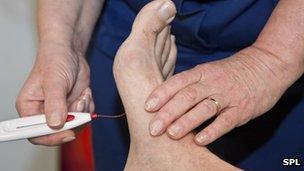Diabetes care depressingly poor, say MPs
- Published

Diabetes patients should be tested for a loss of sensation in the feet
The standard of care for diabetes in England is "depressingly poor", causing unnecessary deaths and disabilities, a parliamentary committee says.
The Public Accounts Committee came to the conclusion after looking at how well the NHS was doing at helping patients manage their condition.
Previous reports have criticised the lack of checks being carried out, such as blood pressure, eye and foot exams.
But the government said services were better than they were being portrayed.
The report by the cross-party group comes after the National Audit Office and Diabetes UK both published critical studies on diabetes care this year.
They both flagged up statistics showing less than half of people with diabetes get all the nine basic tests they should.
Without effective care, patients can develop a range of complications, including blindness and kidney disease.
If everyone got the right care, it is estimated 24,000 lives could be saved each year.
The report said despite the clear consensus over what diabetes patients needed, performance had been "depressingly poor".
'Postcode lottery'
Committee chairwoman, Margaret Hodge, said: "There is no strong leadership and no effective accountability.
"Variation in the level of progress across the NHS also means that there is an unacceptable 'postcode lottery' of care."
Barbara Young, chief executive of Diabetes UK, said: "Given all the increasingly strong evidence of inadequate care, we simply cannot understand why the NHS has sleep walked into this situation."
But a Department of Health spokesman said: "We do not accept the conclusion that services are 'depressingly poor' as there has been progress - an extra 750,000 people got all nine diabetes checks over the last four years.
"But we know there has been unacceptable variation and we are determined to put that right."
He said the new arrangements for the NHS, which will kick in next year, would help as giving GPs control of the budget would lead to much better integration of services and so ensure the right checks for conditions such as diabetes were carried out.
- Published14 August 2012
- Published31 July 2012
- Published23 May 2012
- Published10 April 2012